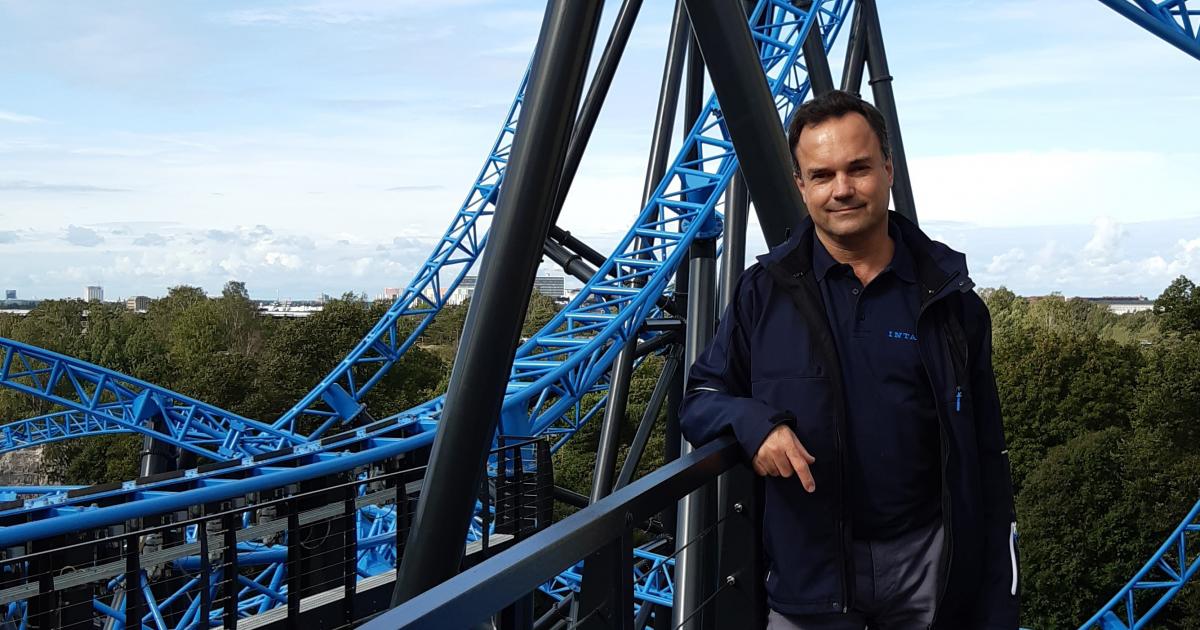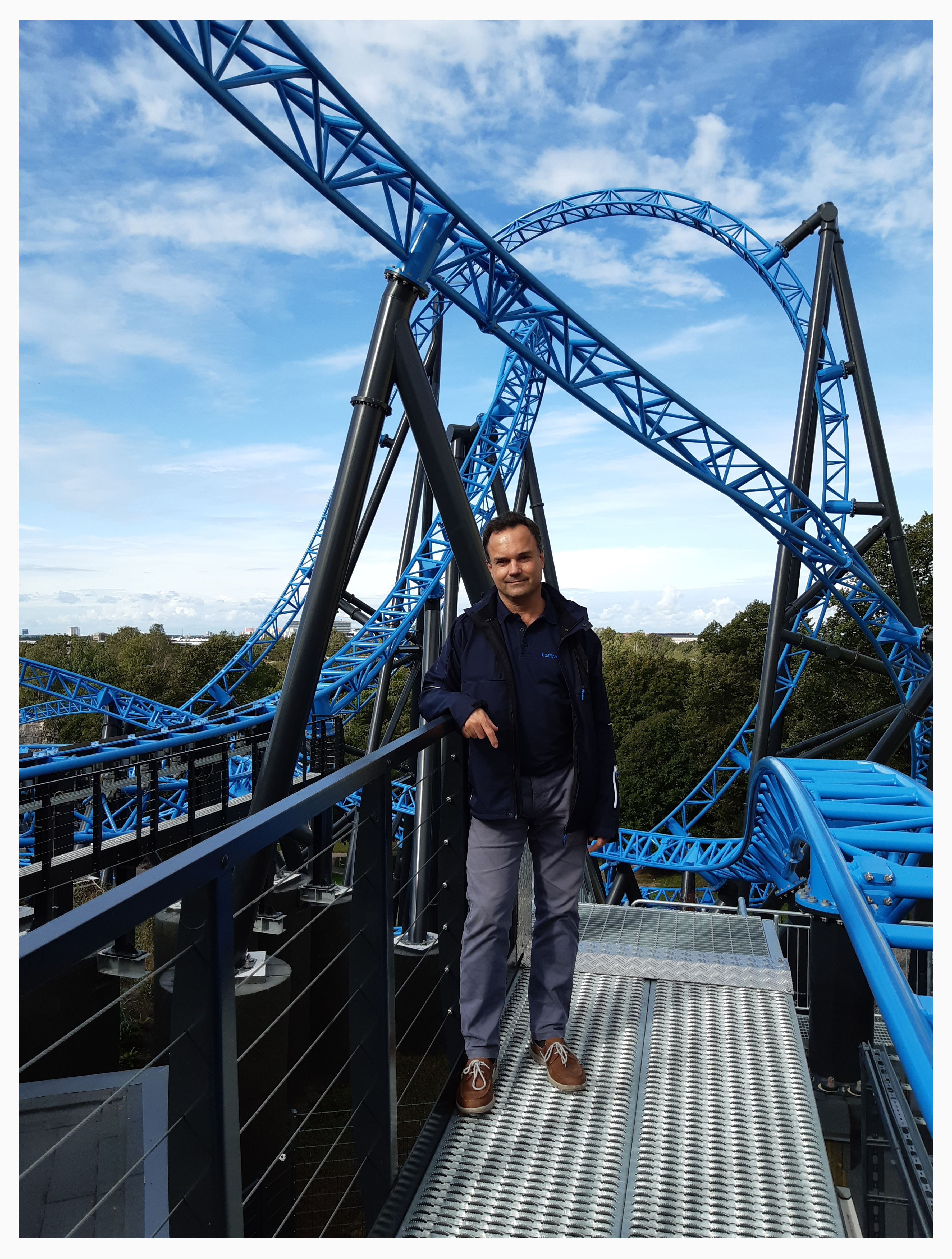I found this interesting interview with the current Intamin Executive Director about his background and experience. You can check the original interview (in Catalan) and find some additional pictures in the article:

 www.fullsdenginyeria.cat
www.fullsdenginyeria.cat
I think it is especially useful for the new generation of engineers who are starting with energy and motivation in this Industry. There are some nice tips on how to specialize if you want to become a Roller Coaster engineer .
.
In the same technical magazine (that belongs to the Catalan Industrial Engineering Institution), they are also publishing some other leisure engineering related articles:
 www.fullsdenginyeria.cat
www.fullsdenginyeria.cat

Ignasi Guasch: “El món virtual no pot competir amb l’experiència d’una muntanya russa”
I think it is especially useful for the new generation of engineers who are starting with energy and motivation in this Industry. There are some nice tips on how to specialize if you want to become a Roller Coaster engineer
In the same technical magazine (that belongs to the Catalan Industrial Engineering Institution), they are also publishing some other leisure engineering related articles:
enginyeria de l'oci
Ignasi Guasch, Intamin Executive Director: "the virtual world cannot compete with the experience of a roller coaster"

(Automatic translation from Catalan)
He liked structures and therefore, before choosing studies, he hesitated between architecture and engineering. He finally decided on industrial engineering and is now one of the few industrial engineers who has developed his professional career managing most of the most important leisure projects of the last 20 years in Catalonia. Ignasi Guasch is executive director of Intamin Amusement Rides , where he has been since its inception at PortAventuraand his time in different companies where he was able to design attractions and theme parks. In this interview with Sheets d'Ingenyria, Guasch tells us how he came to be the top manager of a company that always works to make "record-breaking" attractions. At the same time, he reflects on the sector, which seems to have no roof, and all its challenges, as also does the recent Leisure Engineering Working Group of Industrial Engineers of Catalonia .
Intamin is the leading roller coaster company in the world. He is currently the co-executive director. Could you tell us a little about what your job entails?
Right now I am the executive director in the company and I report to the property. But I started as an engineer leading one of the projects with the operator Universal Studios, ten years ago now. When I finished it, I was put in charge of managing the roller coaster department. And for a couple of years I have assumed the executive direction of the company. Now yes, I carry the entire operation.
It's a management job but you've gone through different stages…
When you are a project engineer, you have to manage the entire project, from signing the contract with the client to delivery and even the warranty period. In this sense, we are responsible for everything from engineering, to production, to all shipping, installation, commissioning... And we have to supervise this whole process within the framework of the contract with fixed budget and time. The most interesting part, for me, is always the engineering and commissioning. You have to think of all the technical solutions and because it's time to check everything.
He landed at his current company after years of leading theme park projects. Why the switch to roller coasters?
I have worked in almost every position in this industry. The first job was at PortAventura, as a very young engineer to carry out the technical part of a new roller coaster. Then we were bought by Universal Studios and then I was a customer, buying attractions, for example. I later went on to work for a design company. It's a small world where the same players are always there and it makes it easy to jump from one side to the other, professionally. I already knew Intamin. In fact, I had bought them from rides like the free fall Hurakan Condor or the Furius Baco when I was at PortAventura, and when they offered me the possibility to come to Intamin, I appreciated that it was another point of view of the business. Maybe it's the most interesting thing from engineering, because you develop the product from scratch. For an engineer, working at Intamin is like being a child at a playground. It is a very attractive industry.
Is it the phase you like the most?
They all have their grace. When you are a customer in a company, you work with the philosophy of that company, the designers and suppliers work for you. When you are a designer you start to have different clients but Intamin is very powerful and we have twenty or thirty projects at the same time and you have to work with all the regulations and ways of doing things for all the clients. Technically it is very attractive; I like it a lot because of the range of ways of doing and working.
It started, however, in PortAventura, how do you rate this stage?
It is the home park. I have a lot of affection for the park and the people. I entered it because Vicenç Veses told me that there was this possibility. So, I'm in this industry because of the park and I appreciate that. I have always kept in touch with them. I've been in it, as a project manager and now as an attraction supplier.
At that time, how did they approach the projects?
I remember it with great difficulty. I was an engineer with no experience but in fact, no one had. The park had just opened and of a team of four I was the only engineer. But bad experiences are used to learn a lot, and that's what I did.
How do you see the theme park industry today? It's not all made up, is it?
No, no. It grows constantly. First, in territory. There are countries that have nothing and there is the 'boom' of the Middle East, Saudi Arabia where there was nothing but now it is being done. And other markets such as the American, which is consolidated, are looking for different products. Much more complex and elaborate installations are presented. More and more different things are wanted and the business is constantly growing. In ten years, we've literally more than doubled in size and it doesn't look like it's going to stop.
When you say it grows in complexity is it technically or in experience?
A little bit of everything. When you do a complicated project it is also more complex, because you have to coordinate more with clients and designers. For this reason, the technology at the level of project development is increasingly complex. Now, for example, we work with 3D models online where all parts work in parallel. It is a way of making very complex buildings, with many interferences and everything coordinated.
And is it easy for them to find staff to work in the sector?
One of the problems we have is that it is difficult to find engineers with experience in designing attractions. They must know how to do everything, bearing in mind that a machine must be reliable and safe, and that we are taking these machines into unknown territory. At Intamin we are always setting records: the fastest, the highest, the most... and you have to use technologies that may not have been tested in these fields. For this, you need engineers who have experience and are not found. After university, there are those who want to work in the world of roller coasters, but many years have to pass before they can have value in the industry. You have to go through good and bad experiences. This is the hardest thing, because this world is growing so much…
And what must be done, then, to work in this sector?
More and more, the tendency is to specialize in some aspect. For example, the design of trains, the design of water flows in water attractions or control systems... are highly valued. We need these specializations. An engineer who wants to build roller coasters will act as a project manager but you depend on the people who technically give you solutions. And for this reason, specialization is one of the most valued aspects. And especially now that the attractions are increasingly complex. The industry has changed a lot. We have many interfaces, lighting, shows, weather... We need specialists to make a good product.
But is this lack at an international level?
Yes, because it is a relatively small industry and there is none.
And why does he think it's not enough?
He doesn't know much about the industry, obviously. And those who know it are young engineers who are fans of this industry who want to design attractions. But designing attractions is many things at once, many subsystems. Sometimes what we need is not what is offered to us.
Where do you think the leisure and entertainment sector is going in the future?
We have great competition: the digital world. Industrial engineers are more hardware but the digital world is taking a lot of people's time to go to leisure, virtual worlds... At the moment, everyone has more resources and leisure time and we can all grow a little. I think what people like is being able to share a physical experience with friends and family that sticks in their brains like a great memory. Luckily, the virtual world can't compete in that.
So there is not so much competition...
Yes, because this is a business and people decide where to spend their money. From our point of view, as providers, we must make a great effort to compete and provide better experiences to surpass those of the virtual world. The truth is that it is coming very far.
We would also like you to give us a small personal assessment of the race. In his case, why did he dedicate himself to it?
When I started as an industrial engineer, I had no intention of working in attractions, but in the end, life takes you there. Now, however, there are more options for young guys to study and enter this industry. When I entered it I immediately saw that it would be very difficult to leave because you really get hooked, the work environment is nice, you travel... All of this makes it a very attractive job. I feel very lucky!
Why industrial engineering?
He had family references, a brother, Vicenç Veses, etc. But the architecture also attracted my attention. It was a 50% decision. In fact, I was thinking of making structures and specialized in that. I always liked building, making physical things, I was a lover of legos, etc. And I ended up studying structures in engineering and I ended up making roller coasters, which are also structures.
I mentioned before the lack of talent in the sector, but is there a lack of vocations, too? How do you think it can be reversed?
I see that young people worry a lot about what work will be like when they leave university. Many do not know and are lost. So those who say they want to do rides need someone to guide them because there are many specializations. Maybe that's what's missing, explaining exactly what you can do when you get out... Mentoring programs help fill this gap through companies and it can even be done before you choose your career. In Switzerland it is done. Children visit companies because it is important to have contact and the idea of knowing how you work and what you do as an engineer. I think this is missing and that everything is very theoretical.
Last edited:
